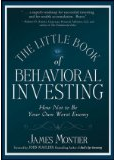 I honestly do not know when or where I first heard of James Montier but believe it was a turning point in my investing and money management. Behavioral Finance / Investing is a relative newcomer to the world of investing, or at least the identification and writing about it. The human frailties have always been here, we just didn’t have a word to describe them. Plus, I have more than once mentioned James Montier’s latest book, “The Little Book of Behavioral Investing” in articles with the comment that you MUST read it and then plan on reading it once a year. I first wrote about it in an article entitled Know Thyself. This article will be about a document he wrote in 2005 entitled Seven Sins of Fund Management.
I honestly do not know when or where I first heard of James Montier but believe it was a turning point in my investing and money management. Behavioral Finance / Investing is a relative newcomer to the world of investing, or at least the identification and writing about it. The human frailties have always been here, we just didn’t have a word to describe them. Plus, I have more than once mentioned James Montier’s latest book, “The Little Book of Behavioral Investing” in articles with the comment that you MUST read it and then plan on reading it once a year. I first wrote about it in an article entitled Know Thyself. This article will be about a document he wrote in 2005 entitled Seven Sins of Fund Management.
Forecasting
Montier ties this with pride. He claims there is an enormous amount of evidence that we simply cannot forecast. I have pounded on this subject unmercifully over the years. Much of the problem is that 75% of managers think they are above average. Well, that just cannot be. Anchoring is the heuristic that probably best describes our ability to focus on irrelevant numbers in the face of uncertainty. Hence, investors continue to rely on forecasts.
The Illusion of Knowledge
Montier ties this with gluttony. All too often, investors are caught in the trap that the more information they have, the better their investment decisions will be. This just simply is not true. I like to challenge modern finance and their belief that the markets are efficient. If they truly were, then an investor would have to know something all the others did not know to be successful. However, I strongly believe the markets are not efficient.
Meeting Companies
Montier ties this with lust. Wall street pays big money to company analysts. These folks visit companies in the industry or sector of their specialty and then write long reports on their findings. Guess what? These reports are nothing more than marketing; trying to get you to buy those stocks and generate commissions.
Thinking You can out-smart Everyone else
Montier ties this with envy. Over-optimism and over-confidence are killers to successful investing. There is a behavioral finance example of this using a beauty contest by Keynes. You can search for it if interested.
Short Time Horizon and Over Trading
Montier ties this with avarice. Trying to outsmart the other investors, too often the time horizon becomes much shorter than originally intended. The average holding period for stocks has continued to decrease; especially since the internet and personal computers. Generally, this has not been good for investors.
Believing Everything You Read
Montier ties this with sloth. I have written often about news being not much more than noise. Investors all too often believe news as fact, even when it is hard to believe in the first place. I have written two articles on this: News is Noise and Fake News!
Group Decisions
Montier ties this with wrath. In this sin he believes that most investors think groups make better decisions that individuals. Social psychologists know this to not be the case. This is why during a police investigation they try to separate observers of the crime to get each individual’s version. Too often in a group, one person can dominate the discussion and lead the group toward his/her opinion. Stay out of investment clubs; they are just for social purposes.
I want to state this again, James Montier is a great writer and his book, “The Little Book of Behavioral Investing” is simply one of the best. StockCharts.com sells it for $19.95, originally it was $24.95.
I wondered why the golf ball kept getting bigger and then it hit me.
Dance with the Trend,
Greg Morris
